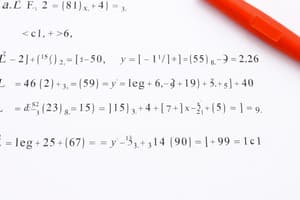Podcast
Questions and Answers
What is the definition of a logarithm?
What is the definition of a logarithm?
- The inverse operation of multiplication
- A measure of the change of base in an exponential function
- A measure of the power to which a base number must be raised to produce a given value (correct)
- A type of exponential function
What is the base of a natural logarithm?
What is the base of a natural logarithm?
- Any positive real number
- 10
- e (approximately 2.718) (correct)
- 2
What is the property of logarithms that states logₐ(xy) = logₐ(x) + logₐ(y)?
What is the property of logarithms that states logₐ(xy) = logₐ(x) + logₐ(y)?
- Change of Base
- Logarithm of a Quotient
- Logarithm of a Product (correct)
- Logarithm of a Power
What is the value of logₐ(1)?
What is the value of logₐ(1)?
What is one of the applications of logarithms in science and engineering?
What is one of the applications of logarithms in science and engineering?
What is the formula for the change of base of a logarithm?
What is the formula for the change of base of a logarithm?
Flashcards are hidden until you start studying
Study Notes
Logarithms
Definition
- A logarithm is the inverse operation of exponentiation
- It is a measure of the power to which a base number must be raised to produce a given value
- denoted as logₐ(x) = y, where a is the base, x is the value, and y is the power
Types of Logarithms
- Natural Logarithm (ln): base is e (approximately 2.718)
- Common Logarithm (log): base is 10
- Binary Logarithm (log₂): base is 2
Properties
- Logarithm of a Product: logₐ(xy) = logₐ(x) + logₐ(y)
- Logarithm of a Quotient: logₐ(x/y) = logₐ(x) - logₐ(y)
- Logarithm of a Power: logₐ(x^y) = y * logₐ(x)
- Change of Base: logₐ(x) = logₖ(x) / logₖ(a)
Rules
- Logarithm of 1: logₐ(1) = 0
- Logarithm of the Base: logₐ(a) = 1
- Logarithm of a Negative Number: not defined for real numbers, but can be extended to complex numbers
Applications
- Solving Exponential Equations: logarithms can be used to solve equations involving exponential functions
- Data Analysis: logarithms can be used to model and analyze data that exhibits exponential growth or decay
- Science and Engineering: logarithms are used in many fields, such as physics, biology, and computer science, to describe and analyze complex phenomena
Logarithms
- Logarithm is the inverse operation of exponentiation, measuring the power to which a base number must be raised to produce a given value.
- Notated as logₐ(x) = y, where a is the base, x is the value, and y is the power.
Types of Logarithms
- Natural Logarithm (ln): base is e (approximately 2.718).
- Common Logarithm (log): base is 10.
- Binary Logarithm (log₂): base is 2.
Properties
- Logarithm of a Product: logₐ(xy) = logₐ(x) + logₐ(y).
- Logarithm of a Quotient: logₐ(x/y) = logₐ(x) - logₐ(y).
- Logarithm of a Power: logₐ(x^y) = y * logₐ(x).
- Change of Base: logₐ(x) = logₖ(x) / logₖ(a).
Rules
- Logarithm of 1: logₐ(1) = 0.
- Logarithm of the Base: logₐ(a) = 1.
- Logarithm of a Negative Number: not defined for real numbers, but can be extended to complex numbers.
Applications
- Solving Exponential Equations: logarithms can be used to solve equations involving exponential functions.
- Data Analysis: logarithms can be used to model and analyze data that exhibits exponential growth or decay.
- Science and Engineering: logarithms are used in many fields, such as physics, biology, and computer science, to describe and analyze complex phenomena.
Studying That Suits You
Use AI to generate personalized quizzes and flashcards to suit your learning preferences.




